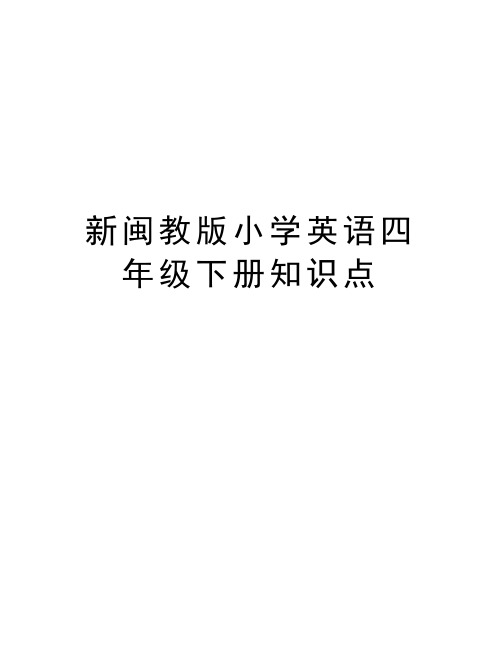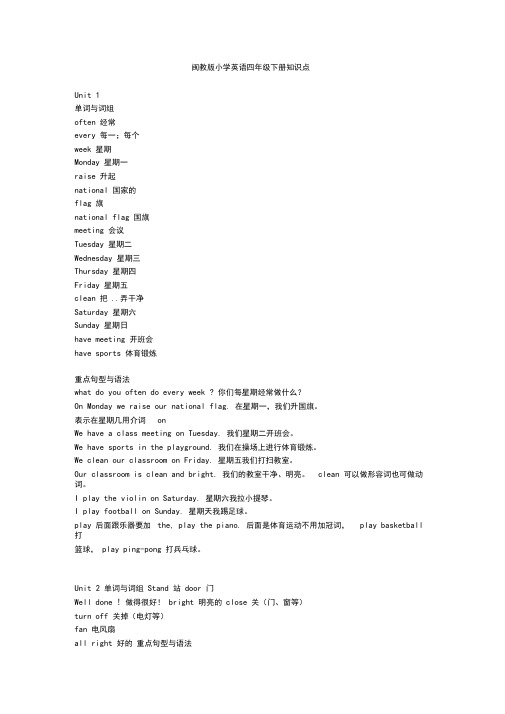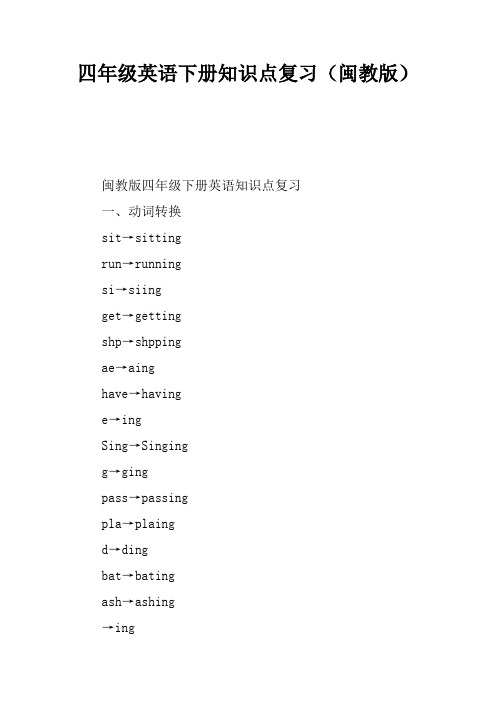闽教版四年级英语下册知识点复习
- 格式:docx
- 大小:170.45 KB
- 文档页数:5

新闽教版小学英语四年级下册知识点新闽教版小学英语四年级下册知识总复习Unit 1 Days of the Week Unit 2 Cleaning DaySunday星期日 Monday星期一 Tuesday星期二Wednesday星期三 Thursday星期四 Friday星期五Saturday星期六 week星期 often 经常every 每一,每个 national flag 国旗 meeting 会议clean把.....弄干净 fan 电风扇 Well done!做得好1、What do you often do every week?(你们每星期经常做什么?)2、On Monday we raise our national flag.(在星期一,我们升国旗。
)3、We have a class meeting on Tuesday.(我们星期二开班会。
)4、We have sports in the playground.(我们在操场上进行体育锻炼。
)5、We clean our classroom on Friday.(星期五我们打扫教室。
)6、I play the violin on Saturday.(星期六我拉小提琴。
)7、I play football on Sunday.(星期天我踢足球。
)8、We dance in the playground on Wednesday. 我们星期三在操场上跳舞。
raise our national flag升国旗have a class meeting开班会dance in the playground在操场上跳舞 have sports做运动clean our classroom打扫教室play the violin拉小提琴play football踢足球play basketball打篮球stand on a chair站在椅子上clean the blackboard擦黑板 clean the desks擦桌子clean the chairs擦椅子clean the window擦窗户clean the door 擦门close the door关门turn off the lights关灯 turn off the fans关风扇watch TV 看电视Unit 3 School SubjectsChinese语文 English英语 math数学music音乐 art美术 PE体育science科学 help 帮助 interesting 有趣的—What day is today? —It’s Monday. 今天星期几?今天星期一。

Unit 1 Winter Vacation短语:the Great Wall 长城watch TV 看电视take a boat tour 划船旅行Sun Moon Lake 日月潭play chess with 与……下棋do my homework 做我的家庭作业swim in the sea 在海里游泳句型:How was your winter vacation? It was wonderful.How about you?Were you in China? No, I wasn’t.How was the weather there? It was hot!动词过去式:is/am —was are —wereeat —ate go —wentsee —saw visit —visitedwatch —watched play —playeddo —did take —tookrun —ran come —cameget —got want —wantedswim —swam give —game语法(一般过去时):(1)规则动词过去式的构成有四条规则:①一般在动词原形末尾直接加上-ed。
如:look—looked,visit—visited,watch—watched。
②以不发音的字母e结尾的动词,只需加-d。
如:live—lived。
③末尾只有一个辅音字母的重读闭音节,先双写这个辅音字母,再加-ed。
如:stop—stopped。
④末尾是“辅音字母+y”结尾的动词,先改y为i,然后再加-ed。
如:study—studied。
(2)不规则动词的过去式需要记忆。
如:am/is—was,are—were,go—went,swim—swam,do/does—did, come—came,take—took,have/has—had等。
学习be动词在一般过去时中的回答:如:①Were they in the supermarket? Yes,they were./ No,they weren’t.② Was he in Beijing? Yes, he was./ No, he wasn’t.Unit 2 A Visit to the Zoo短语:over there 那儿go straight 直走have a look 看一下turn left/right 向左/右转behind the hill 在山后take a photo of 给……照相give food to the monkeys 给猴子喂食under the tree 在树下句型:Where are they?There are some elephants behind the hill.What animals did you see, children?Did you give bananas to the monkeys?Did you take any photos?语法:学习过去时did作为疑问句开头的回答:如:①Did you take any photos? Yes, I did. / Yes, I took some photos.②Did you give food to the monkeys? No, we didn’t.③What animals did you see?We saw tigers, bears and elephants.④—Did you have a good time?(你们玩得快乐吗?)—Yes,we did./ Yes,we had a good time.(是的,我们玩得很快乐。

Unit 1 Days of the Week&Unit 2 Cleaning Day一、单词:Sunday星期日Monday星期一Tuesday星期二Wednesday星期三Thursday星期四Friday星期五Saturday星期六week星期often 经常every 每一,每个national flag 国旗meeting 会议clean把.....弄干净fan 电风扇二、句子:1、Well done!做得好2、What do you often do every week?(你们每星期经常做什么?)3、On Monday we raise our national flag.(在星期一,我们升国旗。
)4、We have a class meeting on Tuesday.(我们星期二开班会。
)5、We have sports in the playground.(我们在操场上进行体育锻炼。
)6、We clean our classroom on Friday.(星期五我们打扫教室。
)7、I play the violin on Saturday.(星期六我拉小提琴。
)8、I play football on Sunday.(星期天我踢足球。
)9、We dance in the playground on Wednesday. 我们星期三在操场上跳舞。
三、短语:raise our national flag升国旗have a class meeting开班会dance in the playground在操场上跳舞have sports做运动clean our classroom打扫教室play the violin拉小提琴play football踢足球play basketball打篮球stand on a chair站在椅子上clean the blackboard擦黑板clean the desks擦桌子clean the chairs擦椅子clean the window擦窗户clean the door擦门close the door关门turn off the lights关灯turn off the fans关风扇watch TV 看电视Unit 3 School Subjects一、词汇:Chinese语文English英语math数学music音乐art美术PE体育science科学help 帮助interesting 有趣的二、句子:1.—What day is today? —It’s Monday. 今天星期几?今天星期一。

闽教版小学英语四年级下册知识点Unit 1单词与词组often 经常every 每一;每个week 星期Monday 星期一raise 升起national 国家的flag 旗national flag 国旗meeting 会议Tuesday 星期二Wednesday 星期三Thursday 星期四Friday 星期五clean 把 .. 弄干净Saturday 星期六Sunday 星期日have meeting 开班会have sports 体育锻炼重点句型与语法what do you often do every week ? 你们每星期经常做什么?On Monday we raise our national flag. 在星期一,我们升国旗。
表示在星期几用介词onWe have a class meeting on Tuesday. 我们星期二开班会。
We have sports in the playground. 我们在操场上进行体育锻炼。
We clean our classroom on Friday. 星期五我们打扫教室。
Our classroom is clean and bright. 我们的教室干净、明亮。
clean 可以做形容词也可做动词。
I play the violin on Saturday. 星期六我拉小提琴。
I play football on Sunday. 星期天我踢足球。
play 后面跟乐器要加the, play the piano. 后面是体育运动不用加冠词,play basketball 打篮球,play ping-pong 打兵乓球。
Unit 2 单词与词组Stand 站door 门Well done ! 做得很好!bright 明亮的close 关(门、窗等)turn off 关掉(电灯等)fan 电风扇all right 好的重点句型与语法Let ' s clean our classroonih我们——起打扫教室吧。

四年级英语下册知识点复习(闽教版)闽教版四年级下册英语知识点复习一、动词转换sit→sittingrun→runningsi→siingget→gettingshp→shppingae→ainghave→havinge→ingSing→Singingg→gingpass→passingpla→plaingd→dingbat→batingash→ashing→ingdra→draingread→readingeat→eatingear→earing二、交通工具、bbus2、bbie3、btrle4、bar、nft6、btrain7、bplane询问做什么交通工具句式为:Hdugtshl?或者Hdeshegtshl?三、食物吃东西用的动词为第一、二人称(如你、我、我们、他们)时用“have”第三人称(如他、她、它)用“has”:、ehavehtdgs2、ehavendls3、ehaverieandfish4、ehaveierea、ehavehaburgers6、ehaveduplings四、单复数、dupling→duplings2、vegetable→vegetables3、haburger→haburgers4、egg→eggs、peah→peahes6、grape→grapes7、ae→aes8、apple→apples9、arrt→arrts0、htdg→htdgs只能是单数表示的东西:、ierea2、fish3、eln4、rie、tea6、fruit7、sap8五、房子结构(要注意搞清楚哪些东西是在哪个房间的)、asittingr2、abedr3、adiningr4、aithen、astud6、abathr六、方位词(n、in或near)、一般在某个物体里面的用“in”如:①、Blabardinlassr②、indsinlassr③、pianintheusir④、penilsinpenil-ase⑤、iereainthefridge2、如果是在某个物体上面,不被包住的用“n”如:①、lntheall②、pituresntheall③、bnthetable3、在某个物体的边上就用“near”七、目、English2、hinese3、ath4、puter、usi6、art7、PE8、siene八、句式、做什么交通工具?Hdugtshl?或者Hdeshegtshl?回答:Igtshlbbus。

闽教版小学英语总复习基础语法四年级下册Unit 1 Days of the WeekWhat do you often do every week?你每个星期经常做什么?On Monday we raise our national flag. 星期一,我们升国旗。
We have a class meeting on Tuesday. 星期二,我们开班会。
We dance in the playground on Wednesday. 星期三,我们在操场上跳舞。
What do you often do on Thursday? 在星期四,你们经常做什么?We have sports in the playground. 我们在操场上做运动。
We clean our classroom on Friday. 星期五,我们打扫教室。
What do you often do on Saturday and Sunday?你们在星期六和星期日经常做什么?I play the violin on Saturday. 星期六我拉小提琴。
I play football on Sunday. 星期日我踢足球。
一般现在时:主要用来表示人或事物的特点,经常或习惯性的动作以及现在的状况;还可以表示客观规律和永恒真理等。
句子中常有often、always、usually、never、very day, sometimes, on Monday, twice a year等表示频率的时间状语。
本课学习的是一般现在时表示经常性或习惯性的动作:What do you often do every week? 你每个星期经常做什么?On Monday we raise our national flag. 星期一,我们升国旗。
We have a class meeting on Tuesday. 星期二,我们开班会。
What do you often do on Saturday and Sunday? 你们在星期六和星期日经常做什么?I play the violin on Saturday. 星期六我拉小提琴。
闽教版小学英语四年级下册知识点Unit 1单词与词组often 经常every 每一;每个week 星期Monday 星期一raise 升起national 国家的flag 旗national flag 国旗meeting 会议Tuesday 星期二Wednesday 星期三Thursday 星期四Friday 星期五clean 把……弄干净Saturday 星期六Sunday 星期日have meeting 开班会have sports 体育锻炼重点句型与语法what do you often do every week ? 你们每星期经常做什么?On Monday we raise our national flag. 在星期一,我们升国旗。
表示在星期几用介词onWe have a class meeting on Tuesday. 我们星期二开班会。
We have sports in the playground. 我们在操场上进行体育锻炼。
We clean our classroom on Friday. 星期五我们打扫教室。
Our classroom is clean and bright. 我们的教室干净、明亮。
clean 可以做形容词也可做动词。
I play the violin on Saturday. 星期六我拉小提琴。
I play football on Sunday. 星期天我踢足球。
play 后面跟乐器要加the, play the piano. 后面是体育运动不用加冠词,play basketball 打篮球,play ping-pong 打兵乓球。
Unit 2单词与词组Stand 站door 门Well done ! 做得很好!bright 明亮的close 关(门、窗等)turn off 关掉(电灯等)fan 电风扇all right 好的重点句型与语法Let’s clean our classroom. 让我们一起打扫教室吧。
闽教版四年级下册英语知识点复习一、动词转换sit→sitting run→running swim→swimming get→getting shop→shoppingmake→making have→having come→comingSing→Singing go→goingpass→passingplay→playing do→doing boat→boatingwash→washing cook→cookingdraw→drawing read→reading eat→eating wear→wearing二、交通工具1、bybus2、bybike3、bymotorcycle4、bycar5、onfoot6、bytrain7、byplane询问做什么交通工具句式为:Howdoyou(they)gotoschool?或者Howdoeshe(she)gotoschool?三、食物吃东西用的动词为第一、二人称(如你、我、我们、他们)时用“have”第三人称(如他、她、它)用“has”:1、wehavehotdogs2、wehavenoodls3、wehavericeandfish4、wehaveicecream5、wehavehamburgers6、wehavedumpling四、单复数1、dumpling→dumplings2、vegetable→vegetable3、hamburger→hamburgers4、egg→egg5、peach→peaches6、grape→grape7、cake→cakes8、apple→apple9、carrot→carrots10、hotdog→hotdog只能是单数表示的东西:1、icecream2、fish3、melon4、rice5、tea6、fruit7、soap8五、房子结构(要注意搞清楚哪些东西是在哪个房间的)1、asittingroom2、abedroom3、adiningroom4、akitchen5、astudy6、abathroom六、方位词(on、in或near)1、一般在某个物体里面的用“in”如:①、Blackboardinmyclassroom②、windowsinmyclassroom③、pianointhemusicroom④、pencilsinmypencil-case⑤、icecreaminthefridge2、如果是在某个物体上面,不被包住的用“on”如:①、clockonthewall②、picturesonthewall③、bookonthetable3、在某个物体的边上就用“near”七、课目(注意有些课目第一个字母要大写,有些整个词都得大写)1、English2、Chinese3、math4、computer5、music6、art7、PE8、science八、句式1、做什么交通工具?Howdoyou(they)gotoschool?或者Howdoeshe(she)gotoschool?回答:I(they)gotoschoolbybus。
Unit 1 Winter Vacation短语:the Great Wall 长城watch TV 看电视take a boat tour 划船旅行Sun Moon Lake 日月潭play chess with 与……下棋do my homework 做我的家庭作业swim in the sea 在海里游泳句型:How was your winter vacation? It was wonderful.How about you?Were you in China? No, I wasn’t.How was the weather there? It was hot!动词过去式:is/am —was are —wereeat —ate go —wentsee —saw visit —visitedwatch —watched play —playeddo —did take —tookrun —ran come —cameget —got want —wantedswim —swam give —game语法(一般过去时):(1)规则动词过去式的构成有四条规则:①一般在动词原形末尾直接加上-ed。
如:look—looked,visit—visited,watch—watched。
②以不发音的字母e结尾的动词,只需加-d。
如:live—lived。
③末尾只有一个辅音字母的重读闭音节,先双写这个辅音字母,再加-ed。
如:stop—stopped。
④末尾是“辅音字母+y”结尾的动词,先改y为i,然后再加-ed。
如:study—studied。
(2)不规则动词的过去式需要记忆。
如:am/is—was,are—were,go—went,swim—swam,do/does—did, come—came,take—took,have/has—had等。
学习be动词在一般过去时中的回答:如:①Were they in the supermarket? Yes,they were./ No,they weren’t.② Was he in Beijing? Yes, he was./ No, he wasn’t.Unit 2 A Visit to the Zoo短语:over there 那儿go straight 直走have a look 看一下turn left/right 向左/右转behind the hill 在山后take a photo of 给……照相give food to the monkeys 给猴子喂食under the tree 在树下句型:Where are they?There are some elephants behind the hill.What animals did you see, children?Did you give bananas to the monkeys?Did you take any photos?语法:学习过去时did作为疑问句开头的回答:如:①Did you take any photos? Yes, I did. / Yes, I took some photos.②Did you give food to the monkeys? No, we didn’t.③What animals did you see?We saw tigers, bears and elephants.④—Did you have a good time?(你们玩得快乐吗?)—Yes,we did./ Yes,we had a good time.(是的,我们玩得很快乐。
闽教英语知识点归纳四下闽教英语是福建教育出版社推出的一套适用于小学低年级的英语教材。
它以全面、系统的方式帮助学生掌握基础英语知识和技能,并培养他们的英语交流能力。
下面将详细介绍闽教英语四下的知识点归纳。
闽教英语四下主要包含以下几个模块:Unit 1 School Life, Unit 2 Fun in the Park, Unit 3 At the Supermarket, Unit 4 A Trip to the Farm, Unit 5 The Weather, Unit 6 My Family, Unit 7 At the Restaurant, Unit 8 In the Zoo, Unit 9 Helping Others, Unit 10 Holidays and Festivals。
每个模块都围绕着一个主题展开,通过不同的教学活动和练习,帮助学生学习相关的词汇、句型和语法知识。
在Unit 1 School Life中,学生将学习有关学校生活的词汇,如classroom(教室)、blackboard(黑板)和desk(桌子)。
他们还将学习一些日常用语,如Can I go to the toilet?(我可以去洗手间吗?),以及一些描述学校生活的句子,如I eat lunch inthe cafeteria.(我在食堂吃午饭)。
通过这些内容,学生能够了解并简单地描述他们的学校生活。
在Unit 2 Fun in the Park中,学生将学习有关公园的词汇,如swing(秋千)、slide (滑梯)和see-saw(跷跷板)。
他们还将学习一些动词短语,如go on the swing(玩秋千)和climb up the ladder(爬上梯子)。
通过这些内容,学生能够描述他们在公园玩耍的经历,并与他人交流。
在Unit 3 At the Supermarket中,学生将学习有关超市的词汇,如fruit(水果)、vegetable(蔬菜)和milk(牛奶)。
闽教版四年级英语下册
知识点复习
集团标准化工作小组 #Q8QGGQT-GX8G08Q8-GNQGJ8-MHHGN#
闽教版四年级下册英语知识点复习一、动词转换
sit→sit ting run→run ning swim→swim ming
get→get ting shop→shop ping wwW .x kB Om
make→mak ing have→hav ing come→com ing
Sin g→Sin g ing go→go ing pass→pass ing
play→play ing do→do ing boat→boat ing
wash→wash ing cook→cook ing draw→draw ing
read→read ing eat→eat ing wear→wear ing
二、交通工具
1、by bus
2、by bike
3、bymotorcycle
4、by car
5、on foot
6、by train
7、by plane
询问做什么交通工具句式为:How do you(they) go to school或者
How does he(she) go to school
三、食物
吃东西用的动词为第一、二人称(如你、我、我们、他们)时用“have”第三人称(如他、她、它)用“has”:
1、we have hot dogs
2、we have noodls
3、we have rice and fish
4、we have ice cream
5、we have hamburgers
6、we have dumplings
四、单复数
1、dumpling→dumpling s
2、vegetable→vegetable s
3、hamburger→hamburger s
4、egg→egg s
5、peach→peach es
6、grape→grape s
7、cake→cake s 8、apple→apple s
9、carrot→carrot s 10、hot dog→hot dog s
只能是单数表示的东西:
1、ice cream
2、fish
3、melon
4、rice
5、tea
6、fruit
7、soap 8
五、房子结构(要注意搞清楚哪些东西是在哪个房间的)
1、a sitting room
2、a bedroom
3、a dining room
4、a kitchen
5、a study
6、a bathroom
六、方位词(on、in或near)
1、一般在某个物体里面的用“in”如:
①、Blackboard in my classroom ②、windows in my classroom ③、piano in the music room ④、pencils in my pencil-case
⑤、ice cream in the fridge
2、如果是在某个物体上面,不被包住的用“on”如:
①、clock on the wall ②、pictures on the wall
③、book on the table
3、在某个物体的边上就用“near”
七、课目(注意有些课目第一个字母要大写,有些整个词都得大写)
1、English
2、Chinese
3、math
4、computer
5、music
6、art
7、PE
8、science
八、句式
1、做什么交通工具
How do you(they) go to school或者How does he(she) go to school
回答:I(they) go to school by bus。
或者he(she) go es to school by bus。
2、吃什么东西
What do you(they) have for lunch或者What does he(she) have for lunch
回答:I(they) have noodls 。
或者he(she)has noodls。
3、今天星期几
What day is today
回答:It is Wednesday.
4、有没有数学、语文课
Do you have a math class on Monday
回答:Yes, I do.
5、你喜欢的课是什么
What’s you favorite subject
回答:I like math.或者简单回答:math
如果是问他或她喜欢什么课,回答时要用“likes”
6、问价格
How mush is it或How mush are they
回答:Sixty-eight yuan.
7、我们需要买些什么
What do we need wwW .x kB Om
回答:We need fish ,eggs,milk and a chicken.
8、什么时候用“there is“什么时候用“there are”
当问或回答的物品是复数且数量是2个以上时用“there are”除此之外都用“there is“。